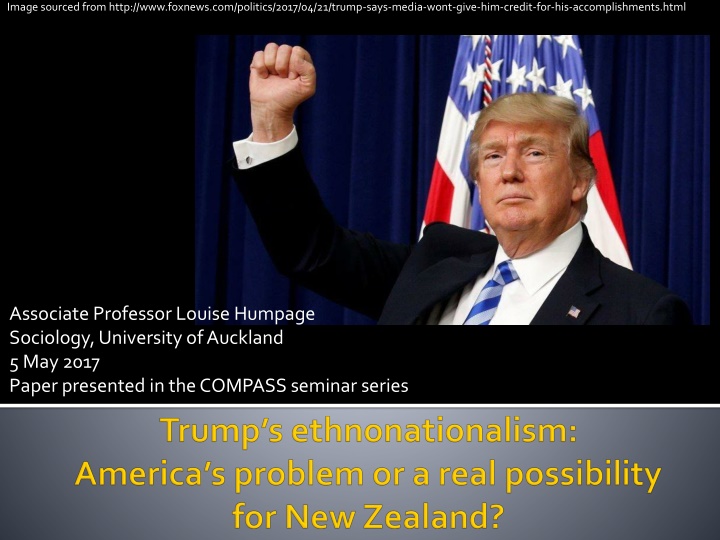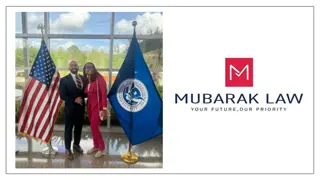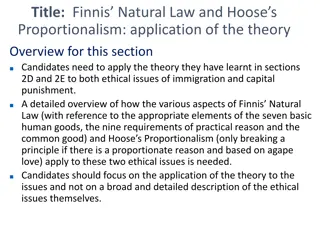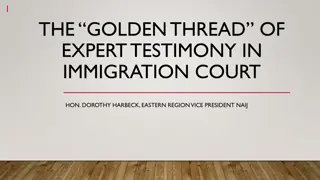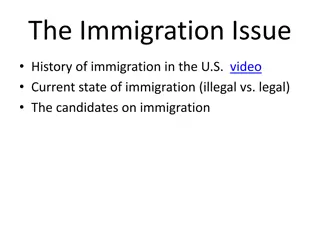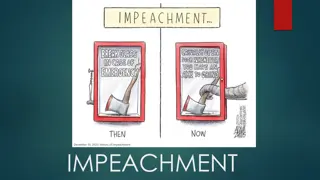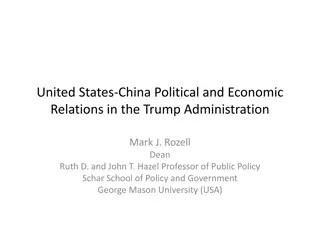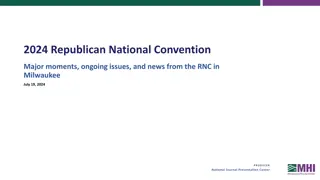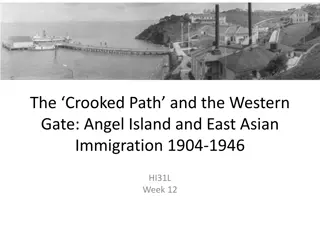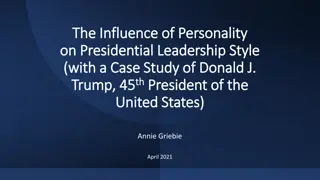Analysis of American Identity and Immigration Policies Under President Trump
The analysis delves into Trump's perspective on American identity, focusing on Anglo-Protestant culture and his views on immigration policies. It discusses his beliefs on loyalty, citizenship, and the impact of immigrants on the country. The narrative also touches upon challenges concerning national identity and citizenship, highlighting key controversies and stances taken by Trump regarding immigration reform and border security.
Download Presentation

Please find below an Image/Link to download the presentation.
The content on the website is provided AS IS for your information and personal use only. It may not be sold, licensed, or shared on other websites without obtaining consent from the author.If you encounter any issues during the download, it is possible that the publisher has removed the file from their server.
You are allowed to download the files provided on this website for personal or commercial use, subject to the condition that they are used lawfully. All files are the property of their respective owners.
The content on the website is provided AS IS for your information and personal use only. It may not be sold, licensed, or shared on other websites without obtaining consent from the author.
E N D
Presentation Transcript
Image sourced from http://www.foxnews.com/politics/2017/04/21/trump-says-media-wont-give-him-credit-for-his-accomplishments.html Associate Professor Louise Humpage Sociology, University of Auckland 5 May 2017 Paper presented in the COMPASS seminar series
Barry Milne and Clark Tipene have been a great help in preparing this and related papers based on the ISSP 2015 data Thanks also to funders of the ISSP survey (including UoA Faculty of Arts PBRF fund)
Image sourced from https://jaxpsychogeo.com/west-riverside-avondale/trump-campaign-office/ Trump regards American identity as reflecting Anglo- Protestant culture and thus only certain groups, principally Anglo-Saxons, possess the moral qualities and cultural values that are inherently American (Citron et al., 2001: 254-55) He accuses naturalised immigrants as retaining stronger loyalties elsewhere and, more controversially, that birth within US borders does not guarantee loyalty to the American nation-state Questioned President Obama s American citizenship and eligibility of his rival for the Republican Party s 2016 nomination, Ted Cruz, who was born in Canada to an American mother and a Cuban father Said a federal judge was biased against him in a fraud case because the judge was born in Indiana to Mexican immigrants Said Florida Senator Marco Rubio favoured amnesty for undocumented immigrants because he is the son of Cuban immigrants
Trump also blames immigration policy for: allowing the wrong types of people into the country (e.g. Mexican immigrants are all criminals, drug dealers, rapists ) and threatening US jobs and social security a wall between Mexico and the US deporting undocumented Mexican immigrants abolishing automatic US citizenship for children born to such immigrants for increasing numbers of Muslims gaining permanent residency - noting that the man behind the 2016 Pulse Nightclub attack in Florida was the son of Afghani immigrants, Trump said [w]e cannot continue to allow thousands upon thousands of people to pour into our country, many of whom have the same thought process as this savage killer immigration bans targeting Muslim-majority countries
National identity relies on citizens viewing themselves as a group, sharing something in common with others they do not know personally: an imagined political community (Anderson 1991). In the US, naturalised citizens officially need only to endorse the national creed to become American = civic nationalism = membership based on shared rights/obligations, political institutions and values But in practice these civic ideals often accompanied by strong public views about nationalism based on descent and ethno-cultural traits Image sourced from http://www.flags.net/UNST.htm
Since 1990, American scholars have been studying what the public believes constitutes a real American - this tells us about the boundaries [Americans] set to determine who is fully in the group and who is not (Theiss-Morse 2012:4) In surveys, they distinguish between: Ascriptive items that are difficult (e.g. English language, belief in God) or impossible (e.g. being born in US) for immigrants to meet exclusive, ethnocultural view of national identity because citizens are believed to share certain characteristics, such as race, ethnicity, and language Civic items that in theory all members in the political community can achieve (e.g. having US citizenship or respect for political institutions) more inclusive cultural pluralist or incorporationist model where citizenship rights are separated from ethnicity/culture
Schildkraut (2014) reports that most US studies find civic notions of American identity more widely endorsed than ascriptive ones. However: Speaking English is considered important by most Americans Ascriptive ideas strengthened after the terrorist attacks on 11 September 2011 Citron et al (1990) predicted a backlash if strong emphasis was placed on preserving group differences because many white Americans associate multiculturalism with special and unjustly favourable treatment for other ethnic groups Age, education and political orientation are most important in explaining ethnonationalist views, challenging perceptions that increasing racial or ethnic diversity is eroding consensus on what being American means (Schildkraut 2014: 448) Racial minorities were more likely than white Americans to view ethnocultural items as important to making someone a true American (high degree of religiosity amongst black and Latino Americans? Greater need amongst minority group members to assert their belonging through rigid rules for membership than majority group members whose belonging is never questioned?)
New Zealand United States In 2014, ethnic minorities represented 38% of the entire US population, up from 33% in 2004 (already the majority in four states and Washington DC). By 2013, 25 per cent of the NZ population was born overseas. The Asian population rapidly increased by 33 percentage points to 12% of the population over the same period. Overseas-born proportion of population almost trebled to 14% between 1965 and 2015, with fundamental changes in the source regions of immigrants over the same period from Europe to South/Central America, Asia, and Africa. The Muslim population increased by 28 percentage points from 2006, but still represents only 1.2% of the NZ population. The US remains home to more Christians than any other country and only 0.9% of the US population identifies as Muslim but the Christian proportion declined from 78% in 2007 to 71% in 2014.
Image sourced from https://www.whaleoil.co.nz/2014/05/winston-peters-deals-media-enquiries/ NZ First Party leader, Winston Peters, has articulated ethnonationlist concerns about (Asian) immigration since 1996: We need to keep a tight lid on immigration if we are to avoid NZ s identity, values and heritage being swamped (2002, cited in Skilling 2012: 370) interviewed to ensure they embody New Zealand attitudes because: We want them to salute our flag, respect our laws, honour our institutions and, above all, don t bring absolutely anti-women attitudes with them, treating women like cattle, like fourth- class citizens (2016, cited Kirk 2016) Proposes that all applicants be We need to put a wall around this country to ensure that we do not have a flood of immigrants competing with us with respect to social services, education and health (2002, cited in Skilling 2012: 370)
Other parties have also proposed reductions to immigration: Labour Party leader Andrew Little vows to slash immigration by tens of thousands in order to give the country a breather . He promised immigration that meets the genuine shortage of skills that we've got, not just the open slather policy we've got right now (cited in NZ Herald 2017) Green Party promises to cap overall net migration at 1 per cent of the population, including returning New Zealanders National government will restrict the ability of lower-skilled migrants to apply to and stay in NZ (arguably shifting towards a guest- worker type programme) BUT McMillan (2010) argues that immigration has not been a political wedge as in the US or Europe since both Centre-Left and Centre-Right governments in NZ agree that skilled migrants are economically necessary to counter population ageing and significant emigration AND NZ First itself is a Centrist party that has supported both Left and Right governments, while anti-immigration sentiment was only one factor behind its electoral success in 1996
New Zealanders generally believe immigration has a positive impact YET support reduced immigration Big improvements in attitudes towards Asian immigrants after 1996, though a hardening between 2012-2015 (Butcher et al 2015) NZES data since 1990 suggests consistently high support for restricting immigration (Skilling 2012) Older people more likely to believe immigration had increased a lot in the last five years and support for immigration restrictions (Ipsos 2016) NZ First and National voters more likely to want to restrict immigration ( Ipsos, 2016; Gower, 2016). NZ born (especially M ori) and immigrants who arrived before 1999 (more likely from UK/Europe) tend to be less positive towards immigration/immigrants (Spoonley et al 2007; Ipsos 2016; MBIE 2017) Unemployment trends unrelated to attitudes towards immigrants but more general perceptions of relative disadvantage may e.g housing affordability (Ward et al. 2011).
Image sourced from https://en.wikipedia.org/wiki/Flag_of_New_Zealand Studies generally show New Zealanders articulate an internationally strong multicultural/bicultural ideology Several older studies (e.g. Gendall et al 2007; Ward et al 2011) find a majority believe immigrants should be able to maintain their traditional culture while also adopting NZ culture and only a minority think immigrants should give up their original culture At least two-thirds of Ipsos (2016) respondents agreed that: it s a good thing for society to be made up of people from different races; migrants make an important contribution to New Zealand s culture and society; migrants make New Zealand more productive and innovative; and migrants have qualities they admire Sibley and Liu (2007) found M ori and P keh respondents unified in terms of their associations with national symbols with P keh respondents strongly associating both P keh andM ori New Zealanders with NZ YET immigrants often feel left out of bicultural relationship (MSD 2008) and P keh often feel disadvantaged by it (Terruhn, 2014)
The International Social Survey Programme module on citizenship, run as part of the Social Attitudes Survey New Zealand in 2015, included 6 ascriptive and 4 civic items that allow us to ask: Is truly being a New Zealander more closely associated with exclusive, ascriptive signifiers or more inclusive, civic items? Have these associations changed since 2003? Are there any differences in the above responses across varied social groups?
The 2015 survey was sent to 2500 individuals (aged 18 years and older) randomly selected from the electoral roll, with 901 returning surveys (36% response rate). Reflecting the electoral roll, the sample was older and contained fewer individuals of M ori descent than found in the general population, while also under-representing those from Auckland and those living in deprived areas and over- representing those in rural areas Weightings were computed to deal with these issues but caution is still needed when cross-tabulating data by: place of birth, ethnicity, political affiliation, party vote in 2014, age and current financial situation. Statistical significance was tested using Chi-square only significant findings discussed
Table 1: How important do you feel each of the following is to truly being a New Zealander? (fairly/very important responses only), by place of birth, percentage in 2015 Overseas born NZ born Be a Christian Have NZ ancestry* Living in NZ currently Born in NZ* Lived in NZ most of your life* Able to speak English Have NZ citizenship* Respect the Treaty of Waitangi* Respect NZ political institutions/laws Feel like a New Zealander * Statistically significant: P-value less than 0.05 17 20 71 38 62 90 83 75 93 91 18 51 64 79 77 87 90 62 90 94
Table 2: How important do you feel each of the following is to truly being a New Zealander? (fairly/very important responses only), by ethnicity, percentage in 2015 NZ NZ European M ori Be a Christian Have NZ ancestry Living in NZ currently Born in NZ Lived in NZ most of your life Able to speak English Have NZ citizenship Respect the Treaty of Waitangi Respect NZ political institutions/laws Feel like a New Zealander * Statistically significant: P-value less than 0.05 Note low sample numbers mean NZ European and NZ M ori were run as binaries 18 45 67 73 74 89 90 *60 *92 94 17 *76 70 *84 *94 *80 92 *84 *81 *92 against non-NZ European and non-NZ Maori. Statistical tests confirm these results are statistically significant despite possible overlaps in these categories
Table 3: How important do you feel each of the following is to truly being a New Zealander? (fairly/very important responses only), by political affiliation, percentage in 2015 Don't know/ Left 11 33 49 50 Centre Right can't choose 24 43 72 72 Be a Christian Have NZ ancestry* Living in NZ currently* Born in NZ* 19 44 66 73 13 54 69 74 Lived in NZ most of your life* Able to speak English* Have NZ citizenship Respect the Treaty of Waitangi* Respect NZ political institutions/laws* Feel like a New Zealander* * Statistically significant: P-value less than 0.05 56 78 84 78 89 87 74 85 87 68 90 92 74 93 92 51 97 99 83 90 89 64 87 94 of the 2015 survey respondents who placed themselves on the political scale identified as Centrist (compared to 19% identifying as Left and 30% on the Right). of the total sample could or would not locate themselves on the political scale.
Table 4: How important do you feel each of the following is to truly being a New Zealander? (fairly/very important responses only), by party vote in 2014, percentage in 2015 Labour National NZ First No vote Be a Christian* Have NZ ancestry* Living in NZ currently* Born in NZ* Lived in NZ most of your life Able to speak English* Have NZ citizenship* Respect the Treaty of Waitangi* Respect NZ political institutions/laws* Feel like a New Zealander* 16 48 67 71 84 86 90 81 91 90 23 44 67 73 70 91 93 53 96 97 34 63 72 79 80 89 94 66 87 94 14 45 65 66 72 84 84 64 88 94 * Statistically significant: P-value less than 0.05 Note all parties for which respondents could vote were analysed but only those relevant to discussion are included here 15% of survey respondents who indicated voting preferences said they did not/were not eligible to vote
Table 5: How important do you feel each of the following is to truly being a New Zealander? (fairly/very important responses only), by age, percentage in 2015 18-30 31-45 46-60 61 + 35 53 64 79 77 75 96 92 93 97 Being a Christian* Having NZ ancestry* Respecting the Treaty of Waitangi Being in NZ right now* Having been born in NZ* Having lived in NZ most of life Respecting NZ political institutions and laws* Being able to speak English* Having NZ citizenship* Feeling like a New Zealander 8 8 16 45 69 68 70 73 92 90 90 95 43 61 54 71 75 83 85 84 93 35 65 57 58 70 88 79 83 88 ! ! ! ! * Statistically significant: P-value less than 0.05
Table 6: How important do you feel each of the following is to truly being a New Zealander? (fairly/very important responses only), by current financial situation, percentage in 2015 Very bad Be a Christian Have NZ ancestry Living in NZ currently Born in NZ* Lived in NZ most of your life Able to speak English* Have NZ citizenship Respect the Treaty of Waitangi* Respect NZ political institutions/laws* Feel like a New Zealander Not good or bad Very good Bad 13 48 58 66 77 87 92 58 92 91 Good 18 83 78 72 74 84 80 83 80 92 13 47 67 73 75 84 89 66 86 91 22 37 62 66 69 89 86 67 94 95 19 45 73 73 74 91 89 55 96 96 * Statistically significant: P-value less than 0.05
ISSP data from 2015 shows that the boundaries of NZ identity are relatively permeable and have overall become a little more inclusive than in 2003 Feeling like a New Zealander and other civic items were rated most highly by respondents as identifiers of truly being a New Zealander There arenonetheless strongly exclusive views that true New Zealanders should be born in NZ and, to a lesser degree, have NZ ancestry, particularly amongst: those aged over 61 and (in some cases) under 35 politically Right, Centre or ambivalent (especially those voting for NZ First) those born in NZ M ori Combined these groups could provide sufficient electoral support to see NZ First become part of government again and put ethno- nationalist ideas into policy
The findings further indicate that NZs current laissez-faire approach to multiculturalism within the context of the bicultural project may be insufficient in the long-term to avoid the growth of ethno-nationalist feelings that further exclude migrants (and M ori) from the national imaginary While NZ attitudes were relatively inclusive overall, radical institutional change is needed to avoid the divisive ethnonationalism evident in the US and Europe. This requires: A form of bi-nationalism providing M ori more certainty about the ongoing role of the Treaty of Waitangi and power-sharing AND A more dynamic multicultural policy that actively supports and welcomes immigrants to NZ AND A process of collective reflection on colonialism, ongoing institutional racism and historical representations of national identity that encourages P keh to acknowledge their privilege within NZ society without recourse to blame
